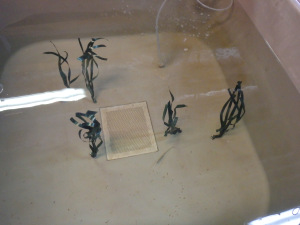The fun challenges of international collaboration!

Collaborating is not always easy–people have different styles, habits, and preferences for just about every stage of a project, from brainstorming ideas to writing up the results in a paper. Add on a layer of cultural and linguistic differences, and you could easily have the opportunity for some major problems!
Luckily, I have not run into any problems with my collaborators here in Sweden (so far), although there are some small challenges that I’ve gotten to face. First, although everyone I’m working with speaks excellent English, some words are not commonly used in either language, so we spend quite a bit of time describing an object or idea because we can’t even remember the word in our own language! For example, I couldn’t remember the English word for this little object:
It’s a nut
…so I went around calling it by its Swedish word, mutter, for days! We use nuts (mutter) to weigh down the fake plants in our fish tanks, in case you were wondering:
One of our fish tanks with fake grass made of green ribbons tied to a nut
There are also some other interesting language challenges, such as the fact that what the Swedes call “high school” (högskolan) is more equivalent to “college,” and what we Americans refer to as “high school” is called gymnasium. This can make describing my educational background a tad confusing!
There are also some cultural differences that take adjusting to. One that I quite enjoy, and would like to start up in the US, is a mid-morning and/or mid-afternoon coffee/tea and cookie break, called fika. It is quite a wonderful tradition! However wonderful it is, though, it is a bit at odds with my workaholic tendencies – I have to stop my work to sit down and have coffee?!
I’ve also faced several logistical issues, including ordering and shipping of ‘hazardous’ laboratory materials, the fact that cheques are almost never used in Europe anymore, and that credit cards should have chips and PIN codes in addition to magnetic strips and signatures. These issues are relatively easy to resolve and not major, but I am lucky that I haven’t encountered anything more problematic.
I think I am probably less thrown off by some of these minor, but pervasive, differences because I am a third culture kid. I can imagine that for other researchers, especially those who work across a broader cultural gap than the American-Swedish one I’m describing here, the challenges may be daunting. However, the scientific problems facing our world are global. Working with people from different perspectives helps us ask better questions and shows us new perspectives, and there are funding incentives to working with international collaborators. I’ve really enjoyed my time working with the people here in Sweden, and I know that I am building a global network of scientists while collecting some cool data. I highly recommend international collaborations, despite the (minor, in my case) challenges.
Sarah Flannagan (@sarahpf19) is a Lecturer at the University of Canterbury in New Zealand. This story was published on June 19, 2014, on Sarah’s blog (available here) and has been republished here with her permission.






